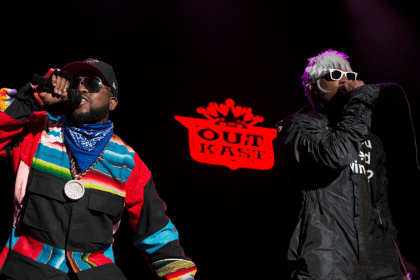OutKast is one of hip-hop’s most beloved acts for a reason. The duo of Andre 3000 and Big Boi aren’t really a thing anymore—despite their well-received reunion shows last year. Nostalgia can distort pretty much anything, but it’s no distortion to declare OutKast the most creatively fearless mainstream hip-hop group of all time; their discography holds up amazingly well and is still stunningly diverse. Each album was like a reinvention of their sound and aesthetic—but not so much so that you couldn’t still hear the enthusiasm of two dope boys from Atlanta in every forward-looking production. Their legacy was cemented long before Y2K, but that was the year they released their big, mainstream breakthrough album. Stankonia was OutKast’s fourth album and became a huge success. It’s specific legacy is a bit complicated because it’s critical acclaim sometimes overshadows the mixed feelings it engendered in some of group’s early fans, who thought the duo was aiming too hard for crossover success and found the album less resonate and unfocused. Many would disagree with that sentiment, but it’s not hard to see both why the album was so polarizing in certain quarters and why it’s so important now. OutKast once again kicked down doors with Stankonia. But that was nothing new.
‘Kast had played a huge role in kicking down hip-hop’s bicoastal door back in 1994.
Southernplayalisticadillacmuzik, the pair’s debut album, was a landmark for southern hip-hop in general but especially for hip-hop coming out of Atlanta. A city that had seen some success with bass music and chart-topping acts like Kris Kross and Arrested Development, Atlanta hadn’t really asserted its own cultural voice into the national hip-hop space until the teenaged Andre (not yet 3000) and Big Boi showed up, rocking Kangols and Braves jerseys while rapping about Cadillacs and MARTA. What followed was increased visibility for ATL hip-hop, with fellow Dungeon Family mainstays Goodie MOB emerging in 1995, Witchdoctor and Cool Breeze following a few years later, and the rise of Lil Jon and the Eastside Boyz, who’s brand of crunk would soon take over mainstream radio and clubs.
In the six years between southernplayalistic… and Stankonia, Atlanta’s hip-hop scene had gone from up-and-coming to on the verge of explosion. Ludacris had been primed for a breakthrough since the 1999 release of his indie debut Incognegro and Lil Jon’s second album We Still Crunk!! had netted him his first taste of real visibility in hip-hop circles. Luda’s major label debut, Back For the First Time dropped just weeks before Stankonia hit stores.
But Stankonia was extremely highly-anticipated amongst hip-hop fans. OutKast’s previous albums, the acclaimed and groundbreaking ATLiens and Aquemini, had made them critical darlings in hip-hop and wider circles. There were high expectations for their first creative statement of the new millennium and singles like “B.O.B.” and “Ms. Jackson” only made the public appetite for this new album more insatiable. Stankonia became one of the most bootlegged albums of that year and there had to be changes made to the album prior to release because piracy was so high on then-popular downloading sites like Napster. “B.O.B.” had garnered tremendous acclaim, but amazingly failed to chart on the Billboard Hot 100. The title, an acronym for “Bombs Over Baghdad,” led to many mainstream radio stations not playing the single out of fear that there was an anti-Islamic message due to President Bill Clinton’s bombing of Iraq in December 1998 during Operation Desert Fox. So it never made much of a chart impact due to lack of radio support, but wound up on virtually every “Best of” list at the end of the year and at the end of the decade.
But the second single, released just weeks before the album, was the inescapable hit “Ms. Jackson,” a song that served as both an apology to and an admonishing of an ex-girlfriend’s mother. It would eventually hit the No. 1 spot on the Billboard Hot 100, and top charts in Germany, Norway and Sweden. OutKast would take home the Grammy for Best Rap Performance in 2002 for the song and it turned them into something they hadn’t been up to that point in their career: bonafide pop stars.
Stankonia turned OutKast into global superstars—something that was met with mixed feelings back in their hometown. The album itself received near-unanimous praise from critics; it featured Dre and Big Boi pushing their combination of earthy funk and futuristic whimsy to even weirder heights. They incorporated drum ‘n bass and psychedelia into songs like “Spaghetti Junction” and “Humble Mumble” while holding it down for the lowriders and 77 Devilles on tracks like “So Fresh, So Clean” and “Gangsta Sh*t.” It was a hodgepodge that didn’t sound at all like its predecessor Aquemini and that caused some fans of their earlier work to decide that OutKast was “going pop.” That’s a silly assertion now, considering there was very little in mainstream music at the turn of the century that sounded anything like what was happening on Stankonia. The album just further proved that OutKast was not an act interested in repeating itself; they didn’t “go pop” inasmuch as pop “went OutKast.” And their boldness paid off: the album reached No. 2 on the Billboard Album charts and would go on to sell 4 million copies in the U.S. alone.
And Stankonia set the stage for the second wave of Atlanta hip-hop that emerged in the early 2000s. Unlike the rootsier artists that had come from ATL in the mid-90s, this new wave was aiming directly for the charts, armed with slick videos and catchy hooks. Within the next two years, Ludacris would become one of the most famous artists in popular music, T.I. would emerge as the new “King of the South,” Lil Jon and the Eastside Boyz would make crunk as mainstream as disco became in the late 70s and by 2005, “trap music” from artists like Young Jeezy would become one of the most influential sounds in hip-hop. In 1994, OutKast had given Atlanta a seat at hip-hop’s table—but post-Stankonia, Atlanta was at the head of that table. The city became the epicenter of mainstream hip-hop for the next decade, as OutKast became even more popular and acclaimed following the release of their Grammy-winning 2003 double album Speakerboxxx/The Love Below. Props to Ludacris, Lil Jon and everyone else who was a part of that early 2000s wave that has influenced so much music both in and outside of Atlanta; but it’s hard to deny how much OutKast: Mach 2 did to announce the city as hip-hop’s new headquarters with their weird monster of an album. 15 years later, you can still smell the aftereffects.
Stank you, OutKast. Stank you smelly much.
note: the original article erroneously stated that the Ludacris album Word of Mouf was released weeks before Stankonia, the album in question was actually Back For the First Time, his major label debut, released October 17th, 2000.














